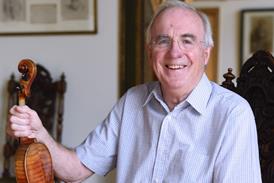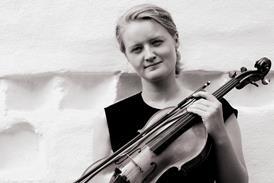Ray Chen’s combined social media platforms attract milions of followers. US correspondent Thomas May speaks with the violinist about his wildly successful work as an online content creator.

Discover more Featured Stories like this in The Strad Playing Hub
A phenomenon in live performance, Taiwanese-Australian violinist Ray Chen has additionally developed a parallel career as a content creator with a vivid and engaging online personality. Just this autumn, his Instagram account surpassed the milestone of 1M followers.
For comparison, Yo-Yo Ma has 944k, Lang Lang 813k, Hilary Hahn 483k and Sheku Kanneh-Mason 301k. If you turn to the crossover area, you’ll find that cellist Hauser commands an IG following of 4.3M while violinist Lindsey Stirling is not far behind at 3.9M.
Chen also maintains a highly active presence on YouTube (>600k followers), TikTok (586k followers) and Facebook (306k followers). In February 2023, Chen and entrepreneur Rose Xi co-founded and launched the app Tonic, a free learning tool that accommodates the practise needs of musicians from beginners to professionals.
With a good decade of online interchange with his fans, Chen feels more convinced than ever that rumours of the demise of classical music are out of touch with the reality.
The fear that fewer people have an interest in classical music, above all among the young generation, simply doesn’t bear up, Chen believes. ’I’ve always believed this isn’t true. But one of the problems has been a small percentage of people being unwelcoming and critical – ironically, online’.
Chen shared his thoughts about how classical musicians can establish an impactful online presence that translates into new audiences for the classical sphere as a whole. He talks about how he pushed past the criticism he found online to be able to share classical music with a larger audience. As possibly the first classical violinist to reach 1M followers on IG, Chen is convinced that ’there’s a whole generation of musicians who will continue to carry the torch as well. experiences reinforce enthusiastic there’s a whole generation of musicians who will continue to carry the torch as well. They just need to be encouraged and led in a positive direction!’
What did hitting the 1M milestone in Instagram feel like?
Ray Chen: Of course, I was happy for myself. But it also opened up a more interesting narrative about the huge gap between people who learn instruments and the ideas or awareness they have of professionals in the concert hall. In no other field are people so unaware of the professionals when they’re learning. In sports, for example – whether it’s soccer, basketball, tennis, even curling – people who are starting out know the professionals.
The crisis we always hear about is that classical music is ‘dying’. Is that actually happening? I would argue: certainly not. But there is an alarming gap between people starting out and learning an instrument and professional performers in the classical world. I think that’s the crisis we should be focused on.
Describe your overall social media demographic.
Ray Chen: If you take Instagram as a lens, most of my followers are a community between the ages of 24 and 35. Geographically, the US tends to be the largest in terms of countries, but if you break it down by cities, there’s a much more globally mixed variety: Hong Kong, Singapore, places like Taipei.
How have you found your audience online?
Ray Chen: I’ve managed to tap into social media by putting myself forward as part of people’s lives, being their friend, making them feel like I’m there through my content. It can range from educational content, entertainment and humour to performance. In the end, a live performance is content too, though a different type.
When I say content, I mean putting yourself out there with that content in any way, shape or form through different channels: say, in The Strad, or on radio stations or on a social media platform. My content has made people feel much closer to me as an artist. In today’s day and age, this is especially important because of all of the choices that we have.
How did you get your base to grow so much? How fast did it happen?
Ray Chen: I did it very gradually for the first nine to ten years of being online, but it was during this past year, starting from the end of 2023, that it took off. A lot of people had questioned me: why are you doing all of this online stuff? Why don’t you just go onstage and play? So I was getting this criticism from a small group of very conservative people in the industry.
And I wasn’t doing it not just because I liked it, or because I thought other people liked it, but because I realised that, just as you can positively impact people by playing a concert, so, too, you can you positively impact people through a video or by creating a platform like Tonic. That was the realisation that unlocked and unblocked me.
I decided that I wouldn’t focus on trying to please a very small, conservative demographic. I would understand who I was in my role, which is specifically to be the guy who welcomes people.
You have a healthy ecosystem or industry when you have all different types of artists. But the industry has become so unhealthy because people tend to criticise or get negative about things. I think a lot of it comes from jealousy and this sense that I’ve worked just as hard and deserve something.
How can you be maximally welcoming to this community you have created?
Ray Chen: You can be welcoming in so many different ways. By creating videos that make people smile, that make people happy. It can be content that varies the repertoire a little bit.
To create content that is welcoming, I always ask myself: who is this for? Do I want it to be wider reaching or for the core audience? I become very intentional about who I’m targeting. For example, if I’m making content about learning a technique. I know it’s not going to go viral overall because it’s not meant for that. I’m targeting this core audience – though it could go viral within that.
Being intentional about things is probably one of the biggest secrets to success in anything – like playing music itself. As you progress through life, you start to learn that you’re not just the main character in your own story: you have to be in everyone else’s stories too. How do you find common ground? This journey has given me lots of insights that have made me a better person and musician.
What are some of your favourite posts?
Ray Chen: One video that I made targeting a specific core audience is for those dealing with insecurity as a musician. It wasn’t intended to be viral but just for those who need it. At the other end of the spectrum, the most viewed video I’ve ever had uses a flash mob concept to play Vivaldi’s Four Seasons. Even my parents got sent this video by people who didn’t know that they were my parents. my friends got sent to it. Through short-form content, we found a way for people to be able to participate as well: they could imagine themselves editing through the concept.
What makes a piece of content go viral?
Ray Chen: When most people think of classical music, they think of this highly produced piece of content. As classical musicians, we’re typically so scared of showing the work in progress and not being 1,000 per cent prepared before we share our craft. Many musicians put perfectionism and preparation over everything else – like musicality, or am I getting something out of the audience?
The average musician sees that approach and thinks: it’s not real, it’s not relatable. It has nothing to do with me. I don’t play like that. But once you see something that was unprepared happen, then it becomes real. It makes you suddenly relatable to this audience.
What is your key advice for young musicians who are building on the increasing success of classical music in these spaces?
Ray Chen: Try everything and don’t be afraid of putting yourself out there. If you truly want to be a professional musician or performer, you shouldn’t be afraid to try everything that you think can work. Not everything is going to work. But don’t be afraid of failure.
This stuff isn’t new. But it is so applicable because a lot of your friends, a lot of your environment and even your teacher are going to say: ’You shouldn’t do that! You should just stay focused on playing your instrument’. But trying something new that could eventually lead to something is not a waste of your time.
Read: Violinist Ray Chen: Making the connection
Read: Ray Chen: ‘Practising with others pushes you to improve’
Listen: The Strad Podcast: How to practise effectively with violinist Ray Chen
Watch: A Strad in action: Ray Chen performs Kreisler’s ‘Schön Rosmarin’
Discover more Featured Stories like this in The Strad Playing Hub.
The number one source for playing and teaching books, guides, CDs, calendars and back issues of the magazine.
In The Best of Technique you’ll discover the top playing tips of the world’s leading string players and teachers. It’s packed full of exercises for students, plus examples from the standard repertoire to show you how to integrate the technique into your playing.
The Strad’s Masterclass series brings together the finest string players with some of the greatest string works ever written. Always one of our most popular sections, Masterclass has been an invaluable aid to aspiring soloists, chamber musicians and string teachers since the 1990s.
The Canada Council of the Arts’ Musical Instrument Bank is 40 years old in 2025. This year’s calendar celebrates some its treasures, including four instruments by Antonio Stradivari and priceless works by Montagnana, Gagliano, Pressenda and David Tecchler.


























































No comments yet